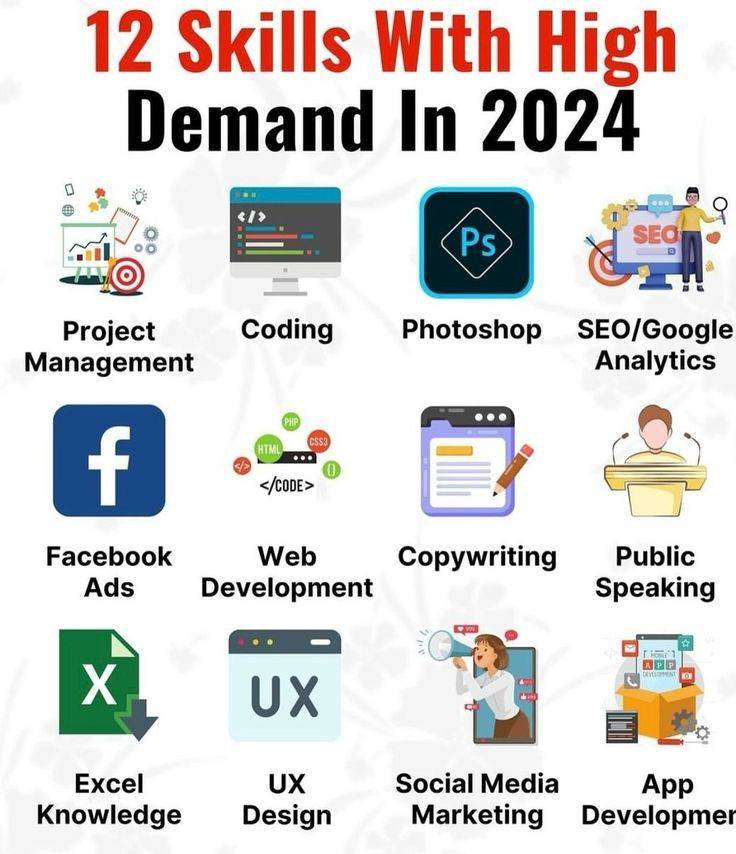Skills to Learn in 2024:
Staying Ahead in a Rapidly Changing World
As we move deeper into the digital age, the demands of the modern world are rapidly shifting. New technologies and evolving industries are continuously shaping the global economy and workforce. For individuals who want to stay ahead of the curve in 2024, mastering a blend of technical, creative, and interpersonal skills is crucial. Whether you’re a professional looking to upgrade your toolkit, a student preparing for future challenges, or someone seeking personal growth, here are some of the key skills to focus on this year.
1. Artificial Intelligence and Machine Learning
Artificial Intelligence (AI) and Machine Learning (ML) continue to revolutionize nearly every sector, from healthcare and finance to marketing and education. Understanding AI frameworks and learning how to build, train, and deploy ML models will open numerous opportunities. Even non-programmers can benefit from AI, as tools and platforms increasingly allow users to leverage AI without deep technical knowledge.
Key Areas to Focus On:
Deep learning and neural networks
Natural language processing (NLP)
AI ethics and governance
AI-powered tools and platforms
2. Data Science and Analytics
Data is the new currency of the digital age. Businesses rely heavily on data-driven decision-making to optimize processes, personalize customer experiences, and drive innovation. Learning data science, analytics, and visualization will help you interpret large datasets and uncover actionable insights.
Key Areas to Focus On:
Data collection and cleaning
Statistical analysis and hypothesis testing
Data visualization tools like Power BI and Tableau
Python and R programming for data analysis
3. Cybersecurity
With cyber threats becoming more sophisticated, cybersecurity skills are more important than ever. Companies need experts who can protect sensitive data and maintain trust in their digital infrastructure. Learning how to identify, prevent, and mitigate cyberattacks is a highly sought-after skill that offers job security in an increasingly online world.
Key Areas to Focus On:
Ethical hacking and penetration testing
Cloud security and encryption
Risk assessment and compliance (GDPR, HIPAA)
Network security and incident response
4. Blockchain and Cryptocurrency
Blockchain technology is best known as the backbone of cryptocurrencies like Bitcoin and Ethereum, but its applications extend far beyond that. Industries like finance, supply chain management, and even healthcare are exploring ways to leverage blockchain for increased transparency and security. Understanding how blockchain works and its potential use cases can open up new opportunities, especially in tech-forward fields.
Key Areas to Focus On:
Smart contracts and decentralized applications (dApps)
Crypto trading and investment strategies
Blockchain development (e.g., Solidity, Hyperledger)
Regulatory and legal aspects of cryptocurrency
5. Digital Marketing and SEO
As the digital landscape becomes more crowded, businesses need to stand out online. Digital marketing, including SEO (Search Engine Optimization), content marketing, and social media strategy, remains crucial for brand visibility and customer engagement. Whether you are a freelancer, entrepreneur, or marketer, knowing how to effectively promote products and services online is an indispensable skill.
Key Areas to Focus On:
SEO techniques and Google algorithms
Social media management and paid advertising
Email marketing and automation tools
Analytics and performance tracking (Google Analytics, SEMrush)
6. Cloud Computing
With the growing adoption of cloud-based services, cloud computing skills are increasingly valuable across industries. Cloud platforms like AWS, Microsoft Azure, and Google Cloud are enabling companies to store, manage, and analyze data on a scale never seen before. Learning how to build, deploy, and manage cloud infrastructure is crucial for IT professionals, developers, and system administrators.
Key Areas to Focus On:
Cloud architecture and design principles
Virtualization and containerization (Docker, Kubernetes)
Cloud migration strategies
Cloud-based AI and data analytics services
7. Creativity and Innovation
While technical skills are critical, creativity remains one of the most valuable human traits. In a world where automation is taking over repetitive tasks, creative problem-solving and innovation will be at a premium. This skill can be applied to product development, design thinking, and even within traditional industries looking to innovate.
Key Areas to Focus On:
Design thinking and creative problem-solving
Brainstorming and ideation techniques
Collaboration in multidisciplinary teams
Human-centered design and user experience (UX)
8. Emotional Intelligence (EQ) and Soft Skills
In an increasingly automated world, the ability to connect with others, demonstrate empathy, and navigate complex interpersonal situations is becoming a competitive advantage. Emotional intelligence (EQ) helps in building stronger relationships, leading teams, and creating more collaborative environments. These soft skills are crucial not only in leadership roles but across all professional levels.
Key Areas to Focus On:
Active listening and empathy
Conflict resolution and negotiation
Team collaboration and leadership
Adaptability and resilience in fast-changing environments
9. Sustainability and Green Skills
As climate change continues to impact industries and economies, sustainability is no longer just a buzzword but a critical area for business development. Understanding environmental regulations, carbon accounting, and sustainable business practices will be essential for companies looking to innovate and reduce their ecological footprint.
Key Areas to Focus On:
Sustainable design and development
Renewable energy technologies
Corporate social responsibility (CSR) strategies
Circular economy and waste management
10. Remote Collaboration Tools and Digital Literacy
With hybrid and remote work models here to stay, mastering remote collaboration tools like Zoom, Slack, and Microsoft Teams is essential. In addition, digital literacy extends beyond basic software skills; it's about effectively navigating the digital environment, managing online communication, and ensuring productivity across time zones.
Key Areas to Focus On:
Project management software (e.g., Asana, Trello)
Virtual communication and presentation skills
Time management and productivity tools
Digital well-being and maintaining work-life balance
Conclusion: Preparing for the Future
2024 is set to be another year of rapid technological advancement, making it crucial to stay adaptable, forward-thinking, and open to learning. By focusing on these in-demand skills, you’ll not only future-proof your career but also contribute meaningfully to the evolving landscape of work and society.
No matter where you are in your professional journey, continual learning is key to staying relevant and competitive in the modern world.
Thanks for reading 📚
MOÃSE




No comments yet
Be the first to share your thoughts!